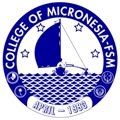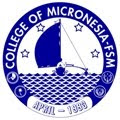The college will be visited in April by a three-member team as set forth by the commission during its June 2010, meeting.
During their June 9-11, 2010, meeting, the Accrediting Commission for Community and Junior Colleges (ACCJC) acted to place the college on warning and required the college to undergo the submission of a follow-up report and a visitation. A follow-up report was submitted by the college accreditation liaison officer, Mr Jon Berger,
on March 15, 2011. The next step would be to receive the visitors, which is currently scheduled for April 11-13, 2011.
According to a letter from President Barbara Beno of the ACCJC to COM-FSM President Spensin James, the visiting team will devote its attention primarily to the following matters as identified in the Action Letter of June 30, 2010:
- Recommendation 1. Improving Institutional Effectiveness and Leadership and Governance. To fully meet this standard, the team recommends the college evolve its communication efforts to ensure broad-based participation and encourage purposeful dialogue in which all stakeholders participate in the exchange of different points of view and reflections that lead to genuine communication and participatory governance (LBA, IV.A.3). With regard to Recommendation 1, the Commission requires that COM-FSM also regularly evaluate the effectiveness of its participatory governance system in helping the institution to achieve its educational mission and to provide quality educational services.
- Recommendation 2. Improving Institutional Effectiveness. To fully meet this standard, the team recommends that the various plans of the college be integrated into the development of a comprehensive long-range educational master plan that is linked to and includes a long-range budget plan (lB4, IILD).
- Recommendation 6. Physical Resources. To fully meet this standard, the college must develop a facilities master plan that reflects the institution's long term educational goals and plans and is linked to an identified, reliable, and ongoing funding source that supports the total cost of facilities ownership (IILB.2.a).
- Recommendation 7. Technology Resources. To fully meet this standard, the team recommends that the college systematically assess its use and need for technology and use the results to develop a new technology plan that is guided by the college's strategic goals and educational master plan (III.C. IILC.la-d, III.C.2).
- Recommendation 8. Financial Resources. To fully meet this standard, the team recommends that the college systematically integrate financial resources planning with the various college plans into a comprehensive master plan that is directly linked to the budget planning and allocation process (IILD.I.a).
- Recommendation 9. Decision-making Roles and Process. To fully meet this standard, the team recommends that the college evaluate its organizational structure and governance processes to ensure that college stakeholders are involved in decision making processes and that the results of systematic evaluations, meetings, and decisions are broadly communicated (IV.A.I, IV.A.2, IV.Ao2.b, IVA.A.3, IV.A.S, IV.B.1.a, IV.B.2.a-b,
- IV.B.2.b, IV.B.2.e).
After the visit, the team chair will prepare a short report which will be presented to the Commission at its June 8-10, 2011, meeting. The college will be informed of its accreditation status after the Commission June meeting.
The three-member team includes the following:
 Sandra Serrano, the team chair, is the Chancellor of the Kern Community College District, a California Community College three-college district. The district's service area spans 26,000 square miles, across parts of five counties. The Kern Community College District has a student enrollment of 30,000 by headcount. There are 374 full time faculty
Sandra Serrano, the team chair, is the Chancellor of the Kern Community College District, a California Community College three-college district. The district's service area spans 26,000 square miles, across parts of five counties. The Kern Community College District has a student enrollment of 30,000 by headcount. There are 374 full time faculty
and an equal number of adjunct faculty, 476 classified staff and 78 administrators. Sandra has 30 years of higher education experience that includes serving as a student services director, dean and vice president, adjunct faculty, and college president. She has a Bachelor of Arts and a Juris Doctorate. She has served on five accreditation teams. She was the chair for the last team that visited the college.

Douglass Dykstra has been Chancellor of Windward Community College since July 1, 2009. Prior to that he served as Vice Chancellor for Academic Affairs at Hawai‘i Community College for five years. He began his career in the University of Hawai‘i Community College System as an Instructor in History in 1975 also working as a grant writer and at various mid-level academic administrative posts at Leeward Community College. He has served on one ACCJC visitation team in 2004. His research interests have been in the fields Hawai‘i immigration history and in other state and local history topics. He served on the last team that visited the college.
 Sean James, Vice Chancellor of Operations Management at the Kern Community College District (KCCD). In his six years with the Kern Community College District his assignments have included Internal Auditor, Interim Director of Fiscal Services, and Vice Chancellor of Operations Management. The duties of the Vice Chancellor of Operations Management include development, design, operation, and improvement of the systems that create and deliver the District’s services. As Internal Auditor Mr. James was responsible for overseeing compliance with the laws and regulations that apply to the Kern Community College District.
Sean James, Vice Chancellor of Operations Management at the Kern Community College District (KCCD). In his six years with the Kern Community College District his assignments have included Internal Auditor, Interim Director of Fiscal Services, and Vice Chancellor of Operations Management. The duties of the Vice Chancellor of Operations Management include development, design, operation, and improvement of the systems that create and deliver the District’s services. As Internal Auditor Mr. James was responsible for overseeing compliance with the laws and regulations that apply to the Kern Community College District.
Mr. James is a Certified Public Accountant licensed in the State of California and has over 15 years experience auditing California Public School Districts. He also served on the last team that visited the college.
3.jpg)



